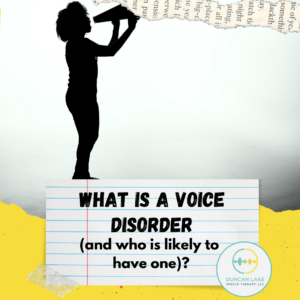By Anna Dubiak, M.S., CCC-SLP
Duncan Lake Speech Therapy, LLC
A voice disorder is when there is an inappropriate discrepancy between vocal quality, loudness, or pitch and a person’s age, gender, cultural background, or geographic location. In short if your voice is not matching your expectation it might be a disorder impacting you. Voice disorders are grouped into 2 distinct categories: organic and functional.
- An organic voice disorder is something that has changed whether in the structure of your vocal folds such as having a nodule which changes the way your voice sounds and the effort which it takes to produce voice, or neurogenic where nerves connected to vocal fold functioning are impacted such as vocal fold paralysis where only one vocal fold is moving where both should be.
- A functional voice disorder results from improper use of the voice when the structures remain unchanged such as vocal fatigue or muscle tension.

While these are the two main classifications of voice disorders there is another type of voice disorder called a psychogenic voice disorder which can be caused by chronic stress, anxiety, or depression.
These voice disorders can cause people to have a voice that is too quiet, strained, breathy, or a number of other qualities that can cause conversational partners to not be able to audibly understand someone with a voice disorder. Voice disorders can often cause people to have a strong emotional connection to their voice issues and this can impact their quality of life.
Who is most likely to get a voice disorder?
- Teachers
- Cheerleaders
- Clergy members
- Lecturers
- Receptionists
- Fitness instructors
- Telephone operators
Are we seeing a common trend?? These groups of people all have speaking heavy jobs so it makes sense that they would be more prone to having a voice disorder.
How can we keep our voice healthy?
- Drink water!!!
- Avoid dehydrating foods and drinks as these may also dehydrate your voice.
- Avoid smoking and dusty places.
- Use a humidifier
- Get appropriate vocal rest when needed



Recent Comments